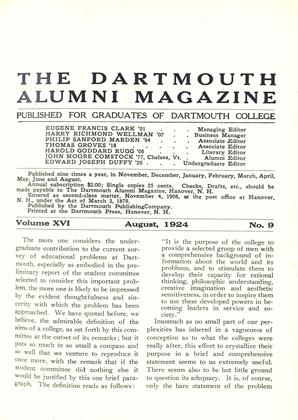Proving beyond all doubt that the athletes of the College rank not only as high as the non-athletic activity men but well above the average of the entire College in scholarship, the figures issued by the Personnel Research Bureau shed a new light upon several recent controversies. The athletic representation on Palaeopitus was cut down. The Senior Educational Committee is reported to have lamented the effect of intercollegiate athletic participation upon scholarship. And yet the figures demonstrate that the average student of Dartmouth might well take a leaf from the lecture notebook of his athletic brother.
"Does this prove that Palaeopitus was wrong? or the Educational Committee? No, and yes. Palaeopitus made no statement concerning the relative scholarship, or even intelligence of athletes and those who are not athletes. It merely discovered from its own experience that the senior governing council needs scope, all the scope it can get, in order to have ideas from all sides of college life. The athletic representation on that body was cut down—not cut out—in order to make this widening of scope possible. Palaeopitus, therefore, is not proved wrong by the figures, nor do the figures bear on the case.
"The Educational Committee, on the other hand, was concerned with the intellectual life of the College, and consequently the scholarship record of each individual student. The Committee went largely on the assumption that time spent perspiring on the gridiron or track was time wasted which might well be placed—and should be placed—on intellectual pursuits. The Committee, when faced with the figures, will perhaps retort that if the athletes can do so well and still waste time in practice, they should do still better by cutting out their athletic efforts.
"There is, however, another turn to the figures. Essentially they show that the athletes are better students than most undergraduates. This is direct proof that 'the busy man neglects nothing.' The man who has time for athletics and the ambition to put himself ahead in competition does not fail to interest himself in scholastic affairs. The Educational Committee does not need to worr}' about competitions, athletic or non-athletic, for the men entering them show an ambition which will at least to some extent draw them into affairs of intellectual interest. The figures on the men in non-athletic organizations when compared with the rest of the College also bear out this conclusion. Worry over the intellectual standing of athletes is useless. Worry rather over the intellectual standing of those with insufficient energy to attempt anything beyond curriculum activities during four years! The non-competitive student is apt to be more narrow in his intellectual way—if he becomes intellectual at all—than the competitor.
"The Dartmouth is not saying that the present status of intercollegiate athletics is helpful to scholarship. We believe quite the reverse. But the proper corrective is not lamentation or abolition. It is control! The present pace needs to be slackened. The rigors and gruelling drills need to be curbed. And the long, hard schedules need to be decidedly shortened, basketball and baseball especially. Figures show that the scholarship of the athlete is not lax, but well taken care of. Let provisions be made for its greater care in the future! But let us not lament the non- existent injury of athletics on intellectualism!"
This comment represents pretty well the undergraduate sentiment.
Chaplain Janeway's many undergraduate friends were sincerely sorry to hear of his decision to leave Dartmouth.
President Hopkins lectured to the Sociology classes just before the final examinations expressing his belief in the League of Nations ideal and in the practicality of the United States co-operating officially. He clearly showed his conclusions were based much on his trip abroad and in the observations he made while stopping at Geneva.
 View Full Issue
View Full Issue
More From This Issue
-
 Article
ArticleThe more one considers
August 1924 -
 Lettter from the Editor
Lettter from the EditorCOMMENCEMENT 1924
August 1924 -
 Article
ArticleRECIPIENTS OF HONORARY DEGREES
August 1924 -
 Article
ArticleVARIATIONS IN THE SCHOLARSHIP OF INDIVIDUALS
August 1924 -
 Class Notes
Class NotesClass of 1903
August 1924 By Perley E. Whelden -
 Class Notes
Class NotesClass of 1903
August 1924 By Perley E. Whelden








